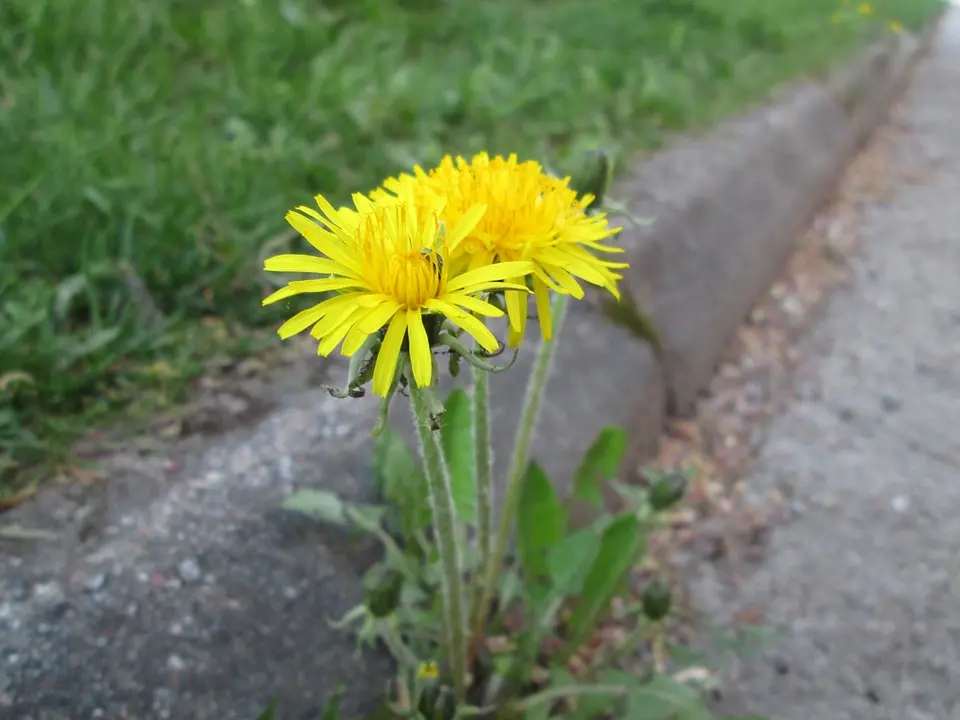
A lush, green lawn is the pride of any homeowner, but pesky weeds can quickly take over and ruin its appearance. Weeds not only detract from the beauty of your lawn, but they can also compete with grass for nutrients and water, ultimately weakening and damaging your lawn.
If you’re struggling with weed control on your lawn, you’re not alone. Our North Carolina lawn fertilization company is sharing our most effective methods for learning how to get rid of weeds in grass and achieve a healthy, vibrant lawn. From proper lawn care and maintenance to the use of pre-and post-emergent herbicides, we’ll provide you with the tips and tricks you need to banish weeds and enjoy a beautiful lawn all season long.
Why Do Weeds Grow in Grass?
Weeds are a common problem in lawns and gardens, and understanding why they grow in the grass is important for effective weed management.
There are several reasons why weeds can take hold in the grass, including:
- Bare or Thin Spots: Bare or thin spots in grass provide the perfect environment for weeds to take root and grow. These areas are often caused by foot traffic, pet damage, or lawn diseases.
- Compacted Soil: Compacted soil can limit the amount of air, water, and nutrients that reach grass roots, making it difficult for grass to grow and thrive. This can create an opportunity for weeds to take over.
- Nutrient Imbalances: Nutrient imbalances, such as a lack of nitrogen or an excess of phosphorus, can cause the grass to weaken and allow weeds to take over.
- Poor Lawn Care: Poor lawn care practices, such as improper mowing, overwatering, or improper fertilization, can also contribute to weed growth. These practices can weaken the grass and make it more susceptible to weed growth.
- Germination of Weed Seeds: Weed seeds are present in most soil and can germinate when conditions are right. If the grass is not healthy and thick, it may not be able to compete with weeds, allowing them to grow and spread.
Preventative Measures for Lawn Weeds
Preventative measures to control weeds involve creating an environment that is less hospitable to weed growth and can be an effective way to minimize where weeds tend to grow and reduce the need for selective herbicides or manual weed removal.
Regular Mowing
Keeping your grass at the right height can help prevent weed growth by shading the soil and preventing weed seeds from germinating. Lawn mowing regularly keeps the grass at the recommended height for your grass species.
Proper Watering
Proper watering can help promote healthy grass growth and prevent weeds from growing. Water your lawn deeply and infrequently to encourage deep root growth and avoid overwatering, which can promote invasive weeds.
Fertilization
Fertilizing your lawn with the right type and amount of fertilizer can promote healthy grass growth and reduce grass-like weeds from growing. Choose a fertilizer with the appropriate nutrient balance for your grass species, and apply it at the recommended rate.
Aeration
Aerating your lawn can help reduce soil compaction and improve air and water flow to the surrounding grass and deep roots, promoting healthy grass growth and reducing the potential of a weed problem.
Soil Testing
Testing your soil can help you identify any nutrient imbalances or pH issues that may be contributing to specific weeds emerging. Adjusting the soil pH and nutrient levels can promote your turf’s health and reduce the growth of annual weeds and perennial weeds.
Use of Pre-Emergent Herbicides
Pre-emergent herbicides can be used to prevent weed seeds from germinating, effectively stopping weed problems before they even start. Apply pre-emergent herbicides according to label instructions and at the right time for your region.
How to Kill Weeds in Grass
Killing existing weeds in grass involves a combination of methods, including the use of herbicides and manual removal. Let’s explore some effective methods for killing weeds in grass that you can DIY or have professionally treated by lawn care specialists.
Post-Emergent Herbicides
Post-emergent herbicides are designed to target specific weeds that have already emerged from the soil. These herbicides can be selective or non-selective, meaning they can target specific weed species or all plants in the area. Follow label instructions carefully, and use caution when applying herbicides to avoid damaging your grass.
Manual Removal
Manual removal of weeds can be effective, but it can be time-consuming and labor-intensive. Pulling weeds by hand or using a hoe or cultivator can help remove weeds from your lawn without the use of herbicides. Be sure to remove the entire weed, including the roots, to prevent the regrowth of the weeds permanently.
Lawn Care Practices
Proper lawn care practices can help prevent weed growth and reduce the need for herbicides or manual removal. Mow your lawn regularly, water deeply and infrequently, and fertilize your lawn with the appropriate type and amount of fertilizer for your grass species.
Solarization
Solarization involves covering an area with clear plastic to raise the soil temperature and kill weeds and other plants. This method can be effective, but it requires several weeks of sunlight and warm temperatures to work.
Use of Natural Herbicides
Natural herbicides, such as vinegar or corn gluten meal, can be effective for killing weeds in the grass without the use of synthetic chemicals. However, these products may not be as effective as traditional herbicides, and multiple applications may be necessary.
Specific Tips for Killing Ground Ivy
Ground ivy, also known as creeping Charlie, is a common weed that can be found in lawns and gardens throughout North Carolina. Ground ivy is a low-growing, creeping perennial that can quickly spread by sending out roots along its stems. The leaves of ground ivy are round or kidney-shaped and have scalloped edges. The plant produces small, purple, or blue flowers in the spring and early summer.
Ground ivy can be difficult to control due to its ability to spread quickly and root deeply. It is often found in areas with moist, shaded soil, such as under trees or along the edges of lawns. Ground ivy can be particularly problematic in lawns where it can quickly take over and outcompete grass for nutrients and water.
Controlling ground ivy typically involves a combination of methods, including the use of herbicides, manual removal, and improving lawn health to prevent weed growth. By addressing ground ivy early and using effective control methods, you can prevent this pesky weed from taking over your lawn or garden.
Maintaining a Healthy Lawn with Fertilization Services from FortSmith Landscaping
Maintaining a healthy lawn in North Carolina requires a combination of proper mowing, watering, and fertilization techniques. At FortSmith Landscaping, we offer expert fertilization services to keep your lawn looking its best.
Fertilization is an important aspect of lawn care, as it provides essential nutrients to promote healthy grass growth and prevent weed growth. Our fertilization services are tailored to the specific needs of your lawn, taking into account the type of grass, soil conditions, and other factors that can impact grass growth.
Our fertilization services include:
- Soil Testing: We start by testing your soil to determine the pH level and nutrient levels. This helps us determine the right type and amount of fertilizer to apply to your lawn.
- Customized Fertilization Programs: We develop a customized lawn care program for your lawn, using the appropriate type and amount of fertilizer for your specific grass species and soil conditions.
- Timely Applications: We apply fertilizer at the right time for your region, typically in the spring and fall when the grass is actively growing and needs additional nutrients.
- Balanced Nutrient Applications: We use fertilizers that are balanced in nutrients, including nitrogen, phosphorus, and potassium, to promote healthy grass growth without promoting excessive weed growth.
- Monitoring and Adjustments: We monitor your lawn throughout the growing season and make adjustments to our fertilization program as needed to ensure optimal grass growth.
By using our expert fertilization services, you can maintain a healthy, vibrant lawn that is resistant to weeds and other lawn diseases. Contact FortSmith Landscaping today to learn more about our fertilization services and how we can help you achieve a healthy lawn in North Carolina.
Contact FortSmith Landscaping for Weed Control and Fertilization Services
If you’re struggling with weed growth in your lawn or want to ensure optimal grass growth with our fertilization services, contact FortSmith Landscaping today!
Our team of experts will work with you to develop a customized weed control and fertilization program tailored to the specific needs of your lawn. We use the latest techniques and high-quality products to keep your lawn looking healthy and vibrant all season long. Don’t let weeds take over your lawn, instead, contact us today to schedule your consultation and take the first step towards a healthy and beautiful lawn in North Carolina!
Get started by filling out our online contact form below or calling us at (919) 228-8495.
